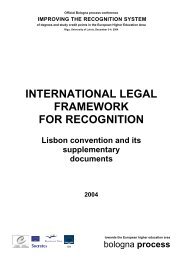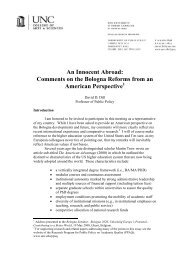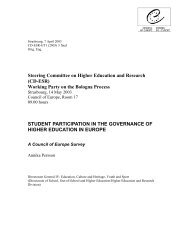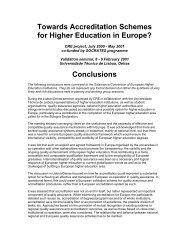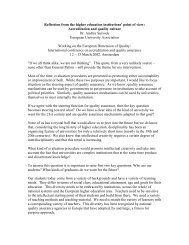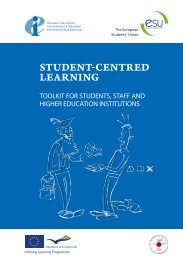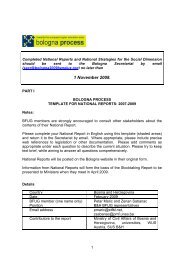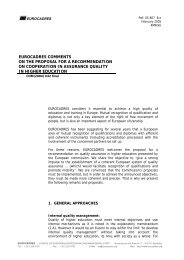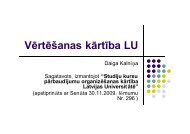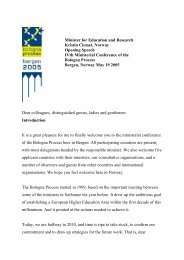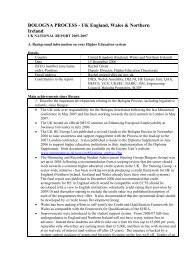EUA Survey Of Master Degrees In Europe - European University ...
EUA Survey Of Master Degrees In Europe - European University ...
EUA Survey Of Master Degrees In Europe - European University ...
Create successful ePaper yourself
Turn your PDF publications into a flip-book with our unique Google optimized e-Paper software.
employers now look for evidence of the ability to complete a course, an aptitude which the openlifelong nature of the Swedish system did not always foster.Clearly, there is scope for better communication between HEIs and employers. <strong>In</strong> a follow-up tothe <strong>EUA</strong> Joint <strong>Master</strong>s Project of 2004, Adina Timofei asked HEIs offering joint degrees whetherthey had sought any employer involvement at the curriculum design stage. Despite citing labourmarket relevance as one of the major motivations for developing their courses, 54% of respondentsreported no consultation and only 14% requested employer feedback.To some extent enterprises are unaware of the HE offer. The representative of a multinationalcorporation, speaking at the Luxembourg conference on employability in October 2008, pointed toa failure by universities to market the new degrees. <strong>In</strong> what do they consist? Have they been tailoredto employers’ needs? And if so, on the basis of what assumptions? Given this limited transparency,he welcomed the DS – to the point of anticipating that his company would soon refuse to considerjob applications which did not attach one.Dialogue and communication are likely to thrive as employers are persuaded that participation incurriculum development, quality assurance and governance is in their interests. <strong>In</strong> no institutionvisited by <strong>EUA</strong> was this participation wholly absent. But it requires a time commitment by bothsides; and this in turn is fostered by a shared culture built up over a period.From the point of view of the HEIs, such a culture consists of a mix of collaborative research, careersguidance systems with links to employers’ bodies, organisational receptivity to inter-disciplinaryinnovation, alumni tracking where privacy laws permit (this is not always the case, for example inGermany), mentoring facilities, and viable, monitored, credited and integrated work placements.It also requires internal agencies, located appropriately within the institutional infrastructure, capableof conducting a dialogue with employers, translating it into strategic thinking and mainstreamingit into action. The French LRU law cited earlier requires all universities to open careers adviceoffices, with responsibility for on-course work placements as well as for counselling in the longerperspective.<strong>In</strong> many HEIs, the relationship with business and industry burgeoned during the years of the COMETTand LEONARDO programmes. A conference hosted by DAAD in Bonn in 2007 demonstrated howurgent it is for this capacity to be revived, refined, and shared. Its detailed recommendations toHEIs, employers, governments and the <strong>Europe</strong>an Commission pointed also to the wider societalcontext. HEI-employer dialogue has to be energised, it said, but not in camera. How to involveNGOs, consumer groups, the media and employees’ organisations in policy formulation and projectmanagement is a question that both parties must address. Since 2007, the <strong>Europe</strong>an Commissionhas run a regular university-business forum to pursue the wide range of issues involved.The <strong>EUA</strong> site visits revealed substantial evidence of the sort of HEI engagement sought by the Bolognaworking group: commitment to regional, national and <strong>Europe</strong>an labour markets; involvement ofsocial partners in institutional governance; participation by employers and professional bodies incurriculum development at <strong>Master</strong> level; enterprise education; work placement schemes; careerscounselling; alumni tracking; an emphasis on inter-personal and inter-cultural skills.According to REFLEX Project fieldwork in France, Germany, Netherlands, Norway and UK, the‘soft’ skills most valued by employers are communication, foreign language, project managementand entrepreneurial skills. These are likely to be fostered in the ethos of student-centred learning,favoured by Bologna. National governments can support developments in this area. The HigherEducation Funding Council for England [HEFCE] has made GBP 60m available for some 30 projects,co-funded by employers, in its Employer Engagement Projects.57



